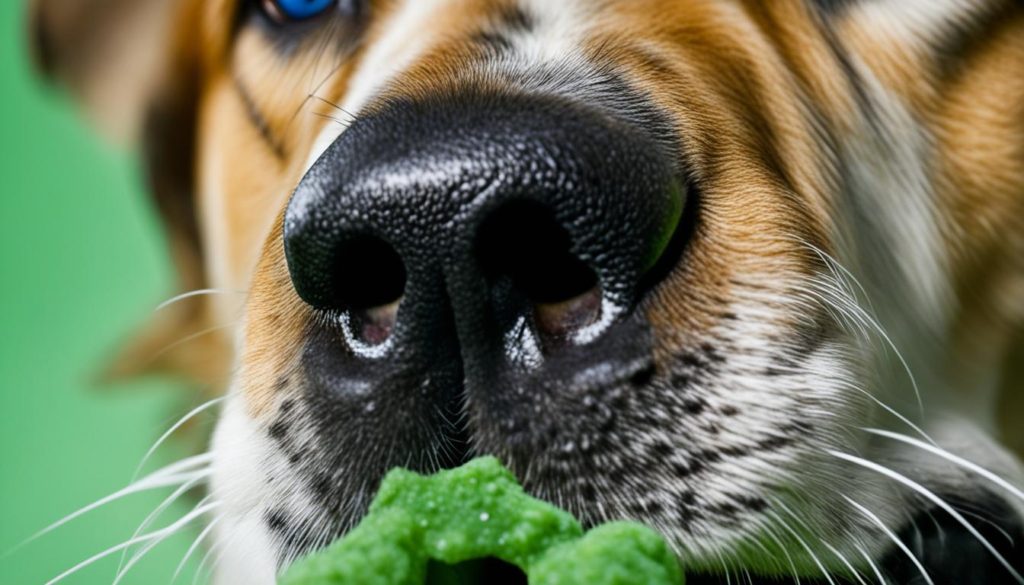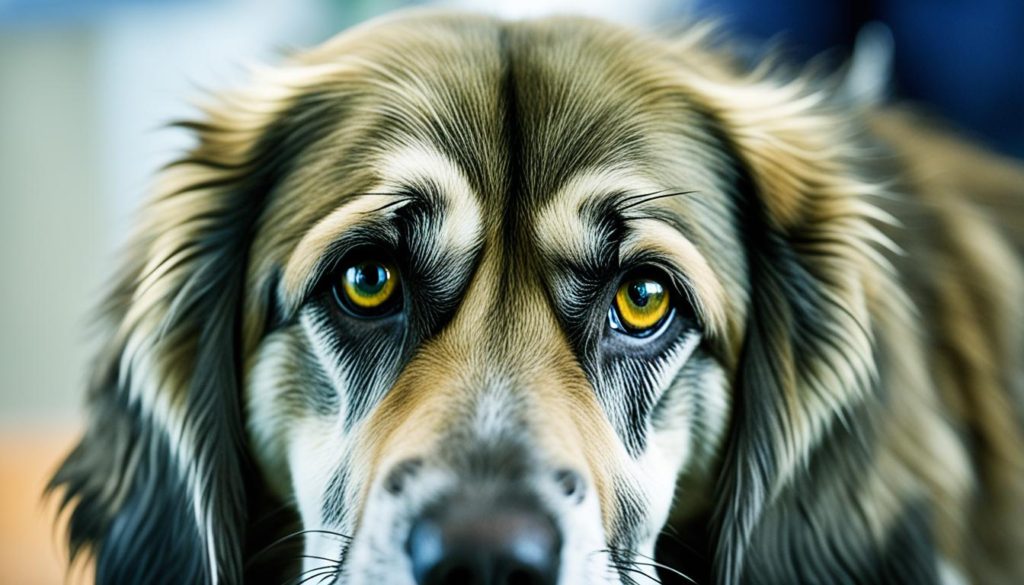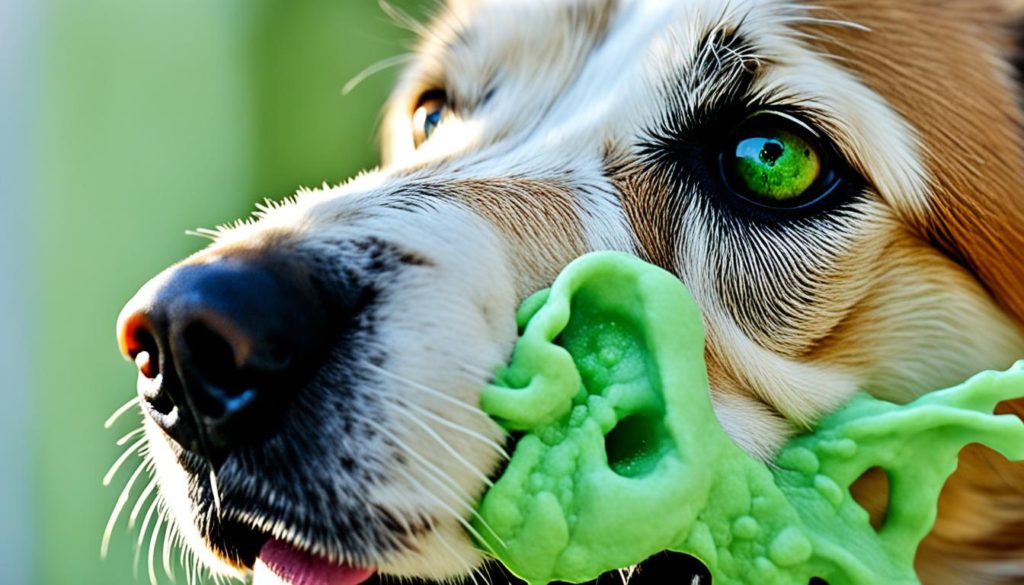If your dog has a runny nose with green mucus, it’s important to understand the potential causes and provide the necessary care.
A runny nose in dogs can be caused by a variety of factors, including allergies, infections, blockages, polyps, tumors, and more.
In this article, we will explore the possible causes of a dog’s runny nose with green mucus and discuss the available treatment options.
It’s important to remember that only a veterinarian can give a proper diagnosis and treatment plan for your furry friend, so if your dog’s symptoms persist or worsen, it’s essential to seek professional advice.
To help you better understand this condition, let’s dive into the various causes and potential treatments for a dog with a runny nose and green mucus.
Key Takeaways:
- A runny nose in dogs with green mucus can indicate allergies, infections, blockages, polyps, tumors, or other underlying health issues.
- Proper diagnosis and treatment should be provided by a veterinarian to ensure the best care for your dog.
- If your dog’s symptoms persist or worsen, it’s important to seek professional advice.
- Monitoring your dog’s symptoms closely and consulting with a veterinarian is crucial in providing appropriate care.
- Remember, only a veterinarian can give a proper diagnosis and treatment plan for your furry friend.
Common Causes of Nose Discharge in Dogs
When your dog has a runny nose with green mucus, it’s essential to understand the underlying causes. Common culprits for nose discharge in dogs include allergies and infections. Dogs can experience allergic reactions to various substances, such as pollen, certain foods, and mites. These allergies can lead to a runny nose with clear discharge.
“Allergies can cause a runny nose in dogs, similar to humans. They may be allergic to substances such as pollen, food, and mites, resulting in clear discharge.”
Infections, both bacterial and viral, can also cause green mucus in a dog’s nose. Along with green discharge, an infected dog may experience other symptoms like a bad odor and coughing or choking due to post-nasal drip. It’s important to identify the root cause of the infection to provide appropriate treatment.
Symptoms of Allergies and Infections in Dogs
- Runny nose with clear discharge (allergies)
- Runny nose with green mucus (infections)
- Bad odor from the nose
- Coughing or choking due to post-nasal drip
Understanding the cause of your dog’s nasal discharge is crucial for proper care and treatment. If you suspect allergies or an infection, consult with a veterinarian to determine the best course of action.
Treatment Options for Allergies and Infections
For allergies, your vet may recommend antihistamines or changes to your dog’s diet or environment to mitigate exposure to allergens. Infections may require antibiotics, antiviral medications, or other specific treatments tailored to the underlying cause.
Remember, it’s always best to consult with a professional to accurately diagnose and treat your dog’s runny nose. They can provide personalized guidance and help ensure your furry friend gets the care they need.
Blockage and Infection
A runny nose in dogs can also be caused by a blockage in the nasal passage. This can occur when a foreign object, such as a seed or blade of grass, becomes lodged in the nostril. Infections, whether bacterial, fungal, or viral, can lead to mucus or pus discharge and may also cause a bad odor and nosebleeds. Treatment options for infections depend on the cause and may include antibiotics or antifungal drugs.
If you suspect that your dog has a blockage in the nasal passage, it’s important to seek veterinary care. The vet will be able to assess the situation and determine the best course of action to remove the blockage safely. Do NOT attempt to remove the blockage yourself, as you may cause further injury or discomfort to your dog.
In some cases, green mucus in your dog’s nose may indicate a bacterial or fungal infection. If you notice green mucus along with other signs of infection, such as a foul odor or nosebleeds, it’s crucial to consult a veterinarian. They will be able to diagnose the infection and prescribe the appropriate medication, such as antibiotics or antifungal drugs, to clear up the infection and alleviate the runny nose.
If your dog’s runny nose with green mucus is caused by an infection, it’s important to follow the prescribed treatment plan and administer the medication as directed by your veterinarian. Be sure to finish the full course of medication, even if your dog’s symptoms improve, to ensure that the infection is completely eradicated.
Common Causes and Treatment Options for Dog’s Runny Nose with Green Mucus
| Cause | Treatment Options |
|---|---|
| Blockage in nasal passage | Removal of the blockage by a veterinarian |
| Bacterial infection | Antibiotics prescribed by a veterinarian |
| Fungal infection | Antifungal drugs prescribed by a veterinarian |
| Viral infection | Supportive care and monitoring |
If you suspect that your dog’s runny nose with green mucus is caused by a blockage or infection, it’s crucial to seek veterinary attention. Your veterinarian will be able to properly diagnose the underlying issue and recommend the appropriate treatment plan to alleviate your dog’s symptoms and promote a speedy recovery.
Polyps, Tumors, and Nostril Problems
Nasal polyps and tumors are potential causes of a dog’s runny nose with green mucus. These conditions can result in blood, pus, or mucus discharge from the nose. Pay attention to other signs such as noisy breathing or a bulge on one side of the nose, as these may indicate the presence of polyps or tumors.
If nasal polyps are present, treatment typically involves surgery to remove them. On the other hand, nasal tumors may require radiation therapy for effective management. It’s crucial to consult with a veterinarian to determine the best course of action for your dog.
| Treatment | Type of Condition |
|---|---|
| Surgery | Nasal polyps |
| Radiation therapy | Nasal tumors |
Some dogs may have nostril issues that make them more prone to nasal discharge. This is particularly common among flat-faced breeds and those with cartilage problems. These structural abnormalities can contribute to a persistent runny nose, so it’s essential to take extra care in managing their symptoms and seeking appropriate medical assistance.

In cases of polyps, tumors, or nostril problems, it is always best to consult with a veterinarian for proper diagnosis and treatment. They can provide you with the guidance and care needed to address these specific issues and improve your dog’s overall health and well-being.
Distemper and Rocky Mountain Spotted Fever
Distemper and Rocky Mountain Spotted Fever are two common illnesses that can cause a dog to have a runny nose with green mucus. Distemper is a viral disease that affects the respiratory system and can lead to a sticky, yellow nose discharge in dogs.
Along with a runny nose, dogs with distemper may experience symptoms such as fever, pneumonia, twitching, and convulsions. The best way to prevent distemper is through vaccination.
Rocky Mountain Spotted Fever, on the other hand, is a bacterial disease that is transmitted by ticks. This illness can also result in a dog having a runny nose with green mucus. In addition to a runny nose, dogs with Rocky Mountain Spotted Fever may exhibit symptoms such as nosebleeds and other flu-like symptoms. Treatment for this bacterial infection typically involves the use of antibiotics and tick prevention measures.
Preventing Distemper and Rocky Mountain Spotted Fever
Prevention is key when it comes to both distemper and Rocky Mountain Spotted Fever. Vaccination is the best way to protect your dog against distemper. Make sure to follow your veterinarian’s recommended vaccination schedule to ensure your furry friend receives the necessary immunization.
When it comes to preventing Rocky Mountain Spotted Fever, it is important to take measures to prevent tick bites. Regularly check your dog for ticks, especially after spending time outdoors in areas where ticks are prevalent. You can also use tick preventives and repellents recommended by your veterinarian to further protect your dog from tick-borne diseases.
| Illness | Symptoms | Treatment |
|---|---|---|
| Distemper | Sticky, yellow nose discharge | Vaccination |
| Rocky Mountain Spotted Fever | Runny nose, nosebleeds | Antibiotics, tick prevention |
By taking proactive measures to prevent these illnesses, you can help keep your dog’s nose healthy and free from green mucus.

Cleft Palate and Fistula
A cleft palate or oral-nasal fistula can be one of the causes of a runny nose in dogs, resulting in nose discharge, especially after eating. These conditions can be brought about by factors such as tooth decay, injury, or infection. The most common treatment for cleft palates and fistulas in dogs is surgery, aiming to close the opening between the nose and mouth, alleviating the symptom of a runny nose.
When a dog has a cleft palate, the roof of their mouth has a fissure or an opening that can extend into the nasal cavity. This structural defect can lead to the accumulation of food and bacteria, causing infections and resulting in a runny nose with green mucus. Oral-nasal fistulas, on the other hand, are abnormal connections between the oral and nasal cavities, which can also contribute to a persistent runny nose.
Surgery is typically the recommended course of action for treating cleft palates and fistulas in dogs. The procedure aims to repair the defect, closing the opening and restoring normal nasal and oral functions. Postoperative care, including antibiotics and pain management, may be necessary to ensure proper healing and reduce the risk of complications.
Key Points:
- A runny nose in dogs can be caused by a cleft palate or oral-nasal fistula.
- These conditions can be the result of tooth decay, injury, or infection.
- Surgery is the most common treatment for cleft palates and fistulas, closing the opening between the nose and mouth.
- Postoperative care and medications may be necessary for a successful recovery.
Runny Nose in Dogs: When to See a Veterinarian
If your dog’s runny nose persists, has abnormal colored discharge, or is accompanied by other symptoms like increased body temperature or lack of appetite, it is important to see a veterinarian. They can diagnose the underlying cause and recommend appropriate treatment. It’s always better to consult with a professional to ensure your dog receives the proper care.
Critical Symptoms to Look Out For
- Persistent runny nose with abnormal colored discharge
- Increased body temperature
- Lack of appetite
In some cases, a runny nose in dogs can be indicative of a more serious underlying condition. The presence of these symptoms may suggest an infection, an allergic reaction, or even the presence of a nasal tumor. It is essential to seek veterinary assistance to explore the underlying cause and provide appropriate treatment.
“A runny nose in dogs can sometimes be a sign of a more serious health issue. If you notice any abnormal symptoms accompanying the runny nose, it is crucial to consult a veterinarian.”
The veterinarian will conduct a thorough physical examination, ask about your dog’s medical history, and may recommend additional diagnostic tests such as bloodwork, nasal swabs, or imaging studies to determine the exact cause of the runny nose. Treatment options will vary depending on the underlying condition. Remember, early detection and intervention can greatly improve your dog’s chances of a full recovery.
When Your Dog Needs Immediate Medical Attention
- Severe bleeding from the nose
- Labored breathing or choking
- Difficulty eating or swallowing
If your dog exhibits any of these symptoms, it is important to seek emergency veterinary care. These signs may indicate a serious medical emergency, such as a nasal injury or obstruction, that requires immediate attention to ensure your dog’s well-being.
Remember, as a pet owner, you play a vital role in your dog’s healthcare. Pay close attention to any changes in your dog’s behavior or health and consult a veterinarian whenever you have concerns. By working closely with your veterinarian, you can ensure your dog receives the proper diagnosis and treatment, leading to a prompt recovery and a happy, healthy pup.
| When to See a Veterinarian | When to Seek Emergency Care |
|---|---|
| Persistent runny nose with abnormal discharge | Severe bleeding from the nose |
| Increased body temperature | Labored breathing or choking |
| Lack of appetite | Difficulty eating or swallowing |
Conclusion
A runny nose with green mucus in dogs can be a worrisome sign of various health issues. It is crucial to identify the underlying cause in order to provide the appropriate treatment. From allergies and infections to blockages and tumors, there are several potential reasons for your dog’s runny nose.
When dealing with a dog with a runny nose and green mucus, it is important to closely monitor their symptoms and seek professional help. Consulting with a veterinarian is essential to receive an accurate diagnosis and develop a proper treatment plan for your furry friend.
Remember, your veterinarian will be able to determine the best course of action based on the specific cause of your dog’s runny nose. Whether it’s medication for an infection, surgery for a blockage, or other targeted treatments, they can provide the necessary care to help your dog recover.
Keep your four-legged companion comfortable and ensure their overall well-being by seeking expert guidance. Trust the expertise of your veterinarian to clear your dog’s runny nose and alleviate any discomfort caused by the presence of green mucus.
FAQ
What are the common causes of nose discharge in dogs?
The common causes of nose discharge in dogs include allergies, infections, and blockages.
Why is my dog’s nose discharge green?
Green nose discharge in dogs can indicate an infection, such as a bacterial or viral infection.
Can allergies cause a runny nose in dogs?
Yes, allergies can cause a runny nose in dogs, resulting in clear discharge.
How can I clear my dog’s runny nose with green mucus?
Clearing your dog’s runny nose with green mucus depends on the underlying cause. It is best to consult with a veterinarian for proper treatment.
Can blockages in the nasal passage cause a runny nose in dogs?
Yes, blockages in the nasal passage, such as foreign objects, can cause a runny nose in dogs.
What are the treatment options for a dog with a runny nose?
The treatment options for a dog with a runny nose depend on the specific cause, which can include antibiotics or antifungal drugs for infections, and surgical removal of polyps or tumors.
What are the symptoms of distemper in dogs?
The symptoms of distemper in dogs include a sticky, yellow nose discharge, along with fever, pneumonia, twitching, and convulsions.
Can a cleft palate or fistula cause a runny nose in dogs?
Yes, a cleft palate or fistula can cause a runny nose in dogs, especially after eating. Surgery is the most common treatment for these conditions.
When should I see a veterinarian for my dog’s runny nose?
You should see a veterinarian if your dog’s runny nose persists, has abnormal colored discharge, or is accompanied by other symptoms like increased body temperature or lack of appetite.

